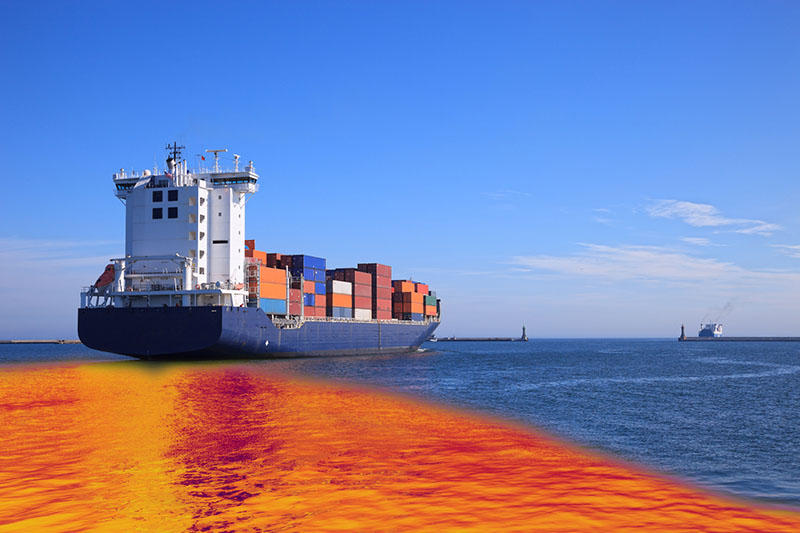Sorry, but your login has failed. Please recheck your login information and resubmit. If your subscription has expired, renew here.
November 2019
We hear a lot about emerging technologies like artificial intelligence, machine learning and robotics. We hear less about one of the enabling technologies that makes the others possible: Browse this issue archive.Need Help? Contact customer service 847-559-7581 More options
Editors Note: This is Part I of a two-part series by Brooks Bentz on the impact of new fuel regulations affecting shipping that take effect on January 2020. Part II will run in the December 2019 issue of Supply Chain Management Review.
The noxious emissions, largely sulfur oxides, as well as nitrous oxides and particulate matter, have become a major environmental concern and have been proven to adversely affect global health as they’re discharged into the atmosphere. According to a Goldman-Sachs study, burning standard bunker fuel (Heavy Fuel Oil or HFO) accounts for almost 90% of sulfur emissions globally, with the largest 15 vessels producing more sulfur than the combined total of all the world’s automobiles.
The International Maritime Organization (IMO) Marpol Annex VI (“Prevention of Air Pollution from Ships”) regulations limiting sulfur content of bunker fuel to 0.5% (down from 3.5%) will take effect on January 1, 2020. A small portion of the 51,000 ships in the global fleet already burn compliant fuel, but the remainder will have only three viable options, and one temporary “hall pass” to comply with the law:

This complete article is available to subscribers only.
Log in now for full access or start your PLUS+ subscription for instant access.
SC
MR
Sorry, but your login has failed. Please recheck your login information and resubmit. If your subscription has expired, renew here.
November 2019
We hear a lot about emerging technologies like artificial intelligence, machine learning and robotics. We hear less about one of the enabling technologies that makes the others possible: Browse this issue archive. Access your online digital edition. Download a PDF file of the November 2019 issue.Editors Note: This is Part I of a two-part series by Brooks Bentz on the impact of new fuel regulations affecting shipping that take effect on January 2020. Part II will run in the December 2019 issue of Supply Chain Management Review.
The noxious emissions, largely sulfur oxides, as well as nitrous oxides and particulate matter, have become a major environmental concern and have been proven to adversely affect global health as they're discharged into the atmosphere. According to a Goldman-Sachs study, burning standard bunker fuel (Heavy Fuel Oil or HFO) accounts for almost 90% of sulfur emissions globally, with the largest 15 vessels producing more sulfur than the combined total of all the world's automobiles.
The International Maritime Organization (IMO) Marpol Annex VI (“Prevention of Air Pollution from Ships”) regulations limiting sulfur content of bunker fuel to 0.5% (down from 3.5%) will take effect on January 1, 2020. A small portion of the 51,000 ships in the global fleet already burn compliant fuel, but the remainder will have only three viable options, and one temporary “hall pass” to comply with the law:
SC
MR


Latest Supply Chain News
- Despite American political environment, global geopolitical risks may be easing
- Joseph Esteves named CEO of SGS Maine Pointe
- Employees, employers hold divergent views on upskilling the workforce
- April manufacturing output slides after growing in March
- Q1 sees a solid finish with positive U.S.-bound import growth, notes S&P Global Market Intelligence
- More News
Latest Podcast

 Explore
Explore
Procurement & Sourcing News
- Despite American political environment, global geopolitical risks may be easing
- April manufacturing output slides after growing in March
- World Trade Centers offers a helping hand to create resilient, interconnected supply chains
- Bridging the ESG gap in supply chain management: From ambition to action
- Israel, Ukraine aid package to increase pressure on aerospace and defense supply chains
- How CPG brands can deliver on supplier diversity promises
- More Procurement & Sourcing
Latest Procurement & Sourcing Resources

Subscribe

Supply Chain Management Review delivers the best industry content.

Editors’ Picks






